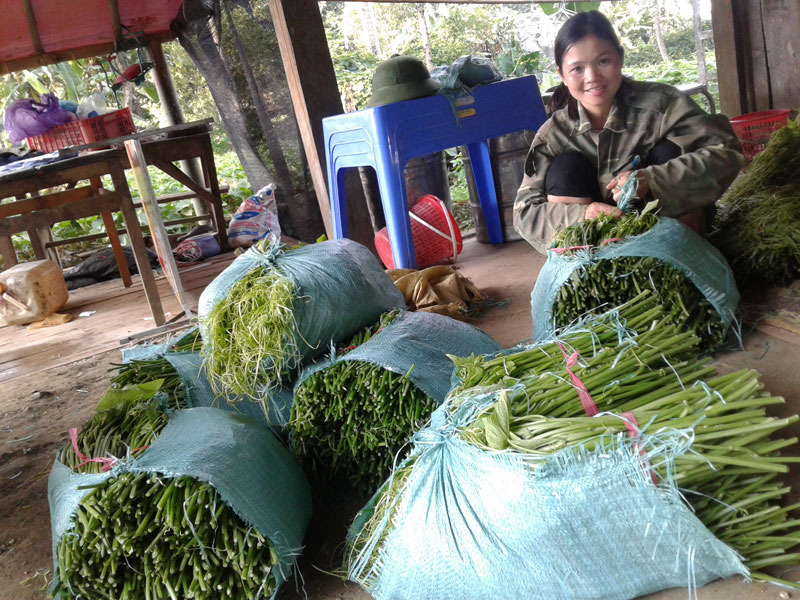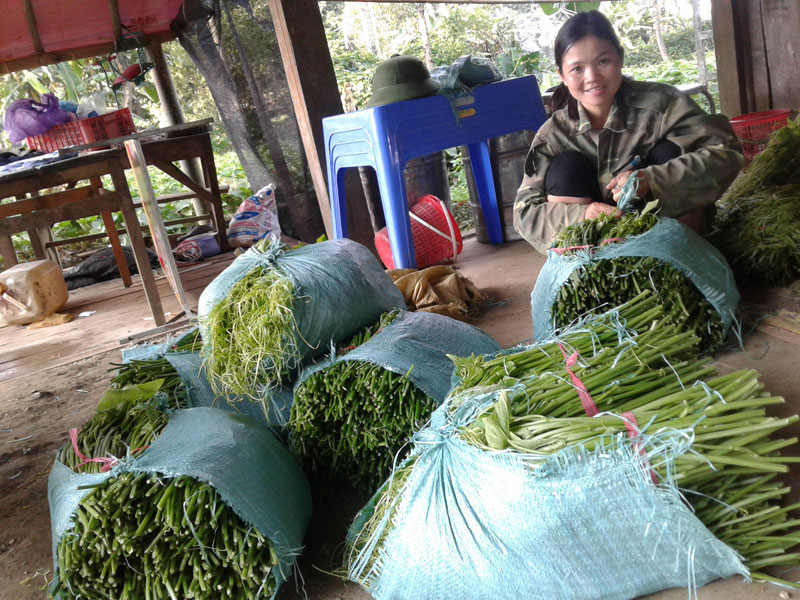
HBO – Visiting Quyet Chien commune, Tan Lac district, this time, we made an appointment with Dinh Thi Quyet, head of the Quyet Chien Cooperative. Although it was established recently, the cooperative supplies several tonnes of organic vegetables for the Hanoi and Vinh Phuc markets everyday.

Dinh Thi Quyet prepares
chayote shoots to be sold at wholesales markets in
Hanoi.
Located nearly
1,000 metres above the
sea level, the Quyet Chien commune has cool climate suitable with many kinds of
vegetables. Many years ago, several companies eyed this land to plant
vegetables and considered it a "miniature of Da Lat”.
Thanks to these advantages, over the past time, the
province’s Department of Agriculture and Rural Development and other
organisations have carried out many projects supporting the development of
organic farming of vegetables in the area. With the hope to switch to
profitable crops, Quyet and other households have actively participated in
these projects. Talking to us, Quyet said: "locals have planted forests, corns
and other food crops on this land for generations. However, these crops produce
low economic efficiency. So it is difficult for us to escape from poverty.
After being trained, I began planting vegetables on nearly 5,000sq.m of land
owned by my family. Participating in the project, we received assistance in the
form of seeds, capital and more importantly, we gained access to advanced
cultivation technologies from experts and different regions, so that we can
learn from experience and determine our own ways. Among the vegetables planted
here, chayote is the most suitable in terms of climate and cultivation
conditions and customs of mountainous residents. Chayote is easy to plant with
little care and prolonged harvest, so we have regular incomes”.
Quyet also visited wholesales markets in Hoa Binh city
and
Hanoi to
seek consumption partners. She learnt that many people liked chayote shoots and
the price remained stable. She set up direct ties with dealers at these
markets, and then purchased vegetables of locals and hired cars to transport to
dealers in
Hanoi.
Quyet said, "Along with vegetables planted on my
family’s 5,000sq.m land, I buy vegetables of villagers. When they trust in me,
they want to sell at stable volume and prices. When delivering vegetables for
distributors, the price is sometimes low due to several objective reasons, but
to maintain stable supply, I myself have to bear the loss, so that villagers feel
secured to continue their plantation”.
Sharing her experience in planting organic vegetables,
Quyet said: "unlike in other areas, in our place chayote shoots can be harvested
all the year round. As the area is surrounded by rocky mountain, we do not have
to water regularly and fertilise much. The plant also suits local soil and does
not attract pests. Therefore, the organic plantation is pretty easy”.
When the Quyet Chien cooperative was established,
Quyet was elected as its head. At that time, 30 households participated in the
cooperative with the understanding that they can only gain a firm foothold on
the market by planting clean and organic vegetables. At present, together with
chayote, the Quyet Chien cooperative also received help to farm off-season
turnip and cabbage./.
According to data from the Hoa Binh Provincial Party Committee, the industrial production index for the first six months of 2025 is estimated to have increased by 20% compared to the same period last year. This marks the highest year-on-year growth rate for this period since 2020.
In the first six months of 2025, Hoa Binh province’s export turnover was estimated at 1.145 billion USD, marking an 18.11% increase compared to the same period in 2024. Import turnover was estimated at $ 804 million, a 17.15% increase, which helped the province maintain a positive trade balance.
The lives of the ethnic minority farmers in Tan Lac district have gradually improved thanks to the new directions in agricultural production. This is a testament to the collective strength fostered through the professional associations and groups implemented by various levels of the district’s Farmers’ Union.
With the motto the "product quality comes first,” after nearly one year of establishment and operation, Muong village’s Clean Food Agricultural and Commercial Cooperative, located in Cau Hamlet, Hung Son Commune (Kim Boi district), has launched reputable, high-quality agricultural products to the market that are well-received by consumers. The products such as Muong village’s pork sausage, salt-cured chicken, and salt-cured pork hocks have gradually carved out a place in the market and they are on the path to obtaining the OCOP certification.
In the past, the phrase "bumper harvest, rock-bottom prices" was a familiar refrain for Vietnamese farmers engaged in fragmented, small-scale agriculture. But today, a new spirit is emerging across rural areas of Hoa Binh province - one of collaboration, organisation, and collective economic models that provide a stable foundation for production.
Maintaining growing area codes and packing facility codes in accordance with regulations is a mandatory requirement for agricultural products to be eligible for export. Recently, the Department of Agriculture and Environment of Hoa Binh province has intensified technical supervision of designated farming areas and packing facilities to safeguard the "green passport" that enables its products to access international markets.



